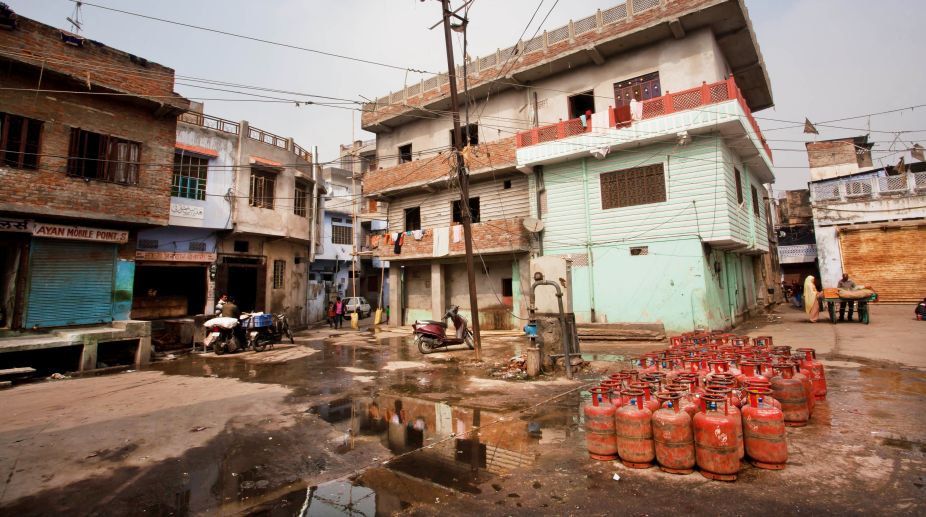When19-year-old Kamala Rani leaves for college, her bag contains along with the usual books and the roti-achar (bread and pickle) in her lunch box, an old salwar kameez set. Her college on Chennai’s famous Marina Beach, is over an hour’s journey from her home – a rundown tin and thatch room behind a large plastic shed on the highway about eight km beyond Tambaram, the suburban train terminus.
This is where Kamala Rani or Kammu as she is called at home, lived since she was eight. She was just a little over three when her parents fled their village 25 km beyond Kanpur along with their children in search of work after two consequent seasons of extreme drought.
Although she would be in time for classes even if she left home around a quarter past eight, Kamala Rani is out of her house by 5:30 am for what her neighbours believe are coaching classes. College gives over by 4:30pm, but by the time she is back, it is usually 8:30 pm instead of 6:00pm, as would be expected.
Advertisement
What exactly does she do in these additional hours? Follow her moped and you will find her making her way to a small set of apartments in one of the newer middle class colonies of Nanganallur, on the outskirts of the expanding city. Entering one of the flats, she hastily changes into her working clothes. For Kamala Rani, another day has begun.
She quickly scrubs the clothes, puts them in the washing machine, washes the dishes and sweeps and mops the floor. Meanwhile, the machine has finished with the clothes and she hangs them out. She has no time for a cup of coffee, so her employer, the elderly Mrs Karthikeyan, thoughtfully packs a couple of idlis for her. And Kamala Rani is off to another house for a similar round of work. Then changing back into more formal wear, she is off to college.
Polishing off the additional snacks after college, she stops over at three more houses for a similar round of chores. The exercise earns her about Rs7,400 a month, most of which she is saving up for further studies as well as for any future contingencies. It hasn’t been easy.
Hers was an orthodox joint family in rural Uttar Pradesh where it is considered almost immoral for girls to be educated, so when her parents sent them to school, they were boycotted by their community.
Three straight years of drought forced Billu, her father, to migrate with the family to faraway Chennai as construction labour. When they went back after two years they found their small holding had been grabbed by the moneylender, as Billu’s brother’s uncles had mortgaged his share of land to raise money.
Unable to fight the village goons, they returned to the shack in the city to continue as labourers. An NGO got the Kamala and her sisters admitted to a municipal school, but even with free education, they found it difficult to meet the odd expenses that cropped up every now and then. Kamala’s teachers persuaded her parents not to pull them out of school since she was doing well, Her parents relented.
To meet school expenses of the three, their mother started working in a few houses. Often the sisters would join their mother after school to help her out. “Initially language was a problem, but we soon picked up Tamil from other children and the houses we worked at”, recall Kamala.
“When my mother met with a serious road accident and was bedridden, my sisters and I took over the work at these houses as we could not afford to lose the income. Eventually, this formed part of our routine. Although other families in our neighbourhood were also migrant labourers, they remained just that since the children were not being sent to school.
On the other hand, my mother now stays at home as she is not well enough to go out and work. Also we have a small television and a better lifestyle than others – we have worked hard to achieve this. We work hard and sincerely. Therefore our employers too treat us well,” says Kamala who plans to do a Master’s in either business or a BEd alongside working once she graduates.
Mrs Karthikeyan is all praise for her. “You can set the clock by Kamala Rani. And she is a thorough professional. She works six days a week, takes a day off for major festivals and two weeks off during her exams. If required, she will come on Sundays for a little extra money. Her siblings will pitch in if we have a big dinner at home and even stay over if needed. She is absolutely regular. And since she is educated, I do not have to bother about hygiene, petty vices or crimes.”
Kamala Rani is one of a new breed of ambitious girls in this metropolis from extremely poor backgrounds who have struggled through school and have taken the shaping of their destinies into their hands. The break of dawn finds a number of these girls from dirty slums off on their two-wheelers – usually mopeds, though bicycles can also be spotted, bought with painstakingly scrounged money often making use of the many hire-purchase schemes that a city like Chennai has to offer.
Or as largesse from the government or some NGO, A large number of them come from migrant families that have moved as unskilled labour into the city slums, working at odd jobs or contractual seasonal labour. Though a majority of them are firstgeneration female literates, it is not uncommon to find girls from educated families that are going through a cash crunch too.
Some of them come from extremely disturbed backgrounds — either broken homes, or an alcoholic father. But common to all of them is the determination to struggle to earn what they see as a life of respectability. A number of them recall their childhood as child labourers —gathering cement that spilled from lorries in sacks, or stealing coal from stationary goods trains, or carrying headloads at brick kilns; often being beaten to goad them to work faster by family and supervisors.
Sulekha and Namita, two such girls who had worked at multiple jobs like these, joined school at the age of eight. Being the oldest in class, they found comfort in sticking with each other.
Sulekha’ mother who worked as a maid, got Namitea’s mother a job as a maid. Eventually, the two girls too started working as domestic help to augment the family income. Their madam’s, sisters who live in the same complex, treat them well and have promised to fund their education till post-graduation. Right now the two are scheduled to appear for their school finals.
Manjula’s mother, who migrated from Guntur, along with her husband to a slum in Porur works as a maidservant in half-a-dozen houses nearby ever since her husband, a cook working in a restaurant, left her and her five children for another woman. Manjula initially began going to school simply because her mother wanted to keep her out of mischief while she was at work.
But Manjula was such a keen student that her teachers persuaded her mother not to discontinue her schooling even after she attained puberty. After Manjula finished her school finals with a second class, with encouragement and help from her teachers, she managed to get admission into one of the city’s colleges. She decided she would not let go off the opportunity, even though her mother could not afford her fees.
With help from one of her teachers, she managed to get her first job working for a family in Teynampet, in the heart of the city and soon found a couple of more houses to work for in the same locality. Apart from her mother and her employers and a couple of very close friends, who have also followed in her footsteps, no one knows what Manjula goes through to pay her fees and buy her books.
Her employer, Govindarajan who works for a nationalised bank, managed to get his friend to sell his used moped on instalments to her.
Even after repaying Rs 250 for this every month and depositing Rs 500 in a jewellery chit scheme, she still manages to take home about Rs 3,200 every month. From this she gives her mother Rs 1,500, and keeps aside Rs 500 for her higher studies, and uses the rest for other personal expenses like petrol and cosmetics. “I usually do not have to spend much money on clothes, except undergarments once in a way.
During festivals like Diwali and Pongal, all my five employers give me clothes. I usually request at least a couple of them to give saris for my mother instead of churidar sets for me, and sometimes I ask for footwear instead of clothes. Besides, the daughter of one of my employers is about my age and usually gives me some of her own used clothes or shoes, before they become too old.
My younger siblings too have started working in two houses, so some their needs too are taken care of. All in all, it is not too bad a life. My mother has been doing this all her life, but with fewer comforts. After my graduation, I shall either do management, or a professional course or appear for the civil services or bank exam. All my employers are decent people and have assured me that they will help me in whatever way they can.” “That is the least we can do for these girls,” says Govindarajan.
Like in all metros, finding reliable domestic help is a problem here too. But these enterprising girls have solved this problem for me. Although they are migrants from extremely backward places, they have adapted well to the city and are working at improving theirs and their family’s lives. Earlier, my maid would be absent at least two days a week without warning, or turn up at any hour of the day she pleased. And that would put my entire schedule out of gear.
Besides little things like my blouses, small vessels, spoons and petticoats would vanish. On top of it, most of them are rude and would walk out on you without warning and gossip no end.
But there is a certain dignity about Manjula. Since she goes to a good college, she has to be punctual. She mixes with decent people. So her behaviour is civil. Besides, she now has a reputation to protect, and would not like to ruin her present and future by indulging in petty thefts. And since she is educated, she does not have to be told about hygiene etc.
I do not grudge the leave she takes during her exams because all her struggle is simply towards that end. And we have ample warning, and know she will be back when promised. It is a good deal for me. Not surprisingly, none of the girls wanted to be photographed and requested that their names be changed to protect their identity. “Ours is a kind of dual life.
We would be treated differently by most of our classmates and even some lecturers if they found out we were simply maidservants. And that would completely destroy all the effort we have put in for years to attain this level of respectability. So please don’t use our names or pictures” requests Aarti, whose family migrated from Hosur and now lives in Avadi.
In fact some of them do not tell even their employers their real names for fear that some stray mention could identify them. Many of the employers themselves were sporting enough to request that their names also be changed, so that the girls are not identified through the employers’ names.
Given an option to work part time in an office or a big establishment like a super market, would the girls be willing to take it up? “If the deal is really attractive, in terms of money and working hours, then I would. In that case, there will be no need for this hide and seek”, says Rathi, whose family migrated from Bellary as quarry labour. A local NGO saw her through school, which ensured that she and her younger brother at least got a free meal every working day and six kilos of rice a month.
However, Sumathi is not so sure. “I would rather continue this. The hideand -seek is the only negative aspect of this job. Otherwise, it is a good job. It is hard for migrants with no local address to get a job or even respect. Our employers need us as much as we need the job, they are fed up of the earlier maids. And because of this and the fact that we are educated, they treat us with respect.
Moreover no other job will give us the perks like good food, clothes, medical care at our level like our employers do give us. They do not shout at us or use abusive language – there is a give and take of dignity. My master, a math professor, gave me free tuition every alternate day, and gave his son’s old books to me. Even now, he purchases the books I need. When we are ill, they usually take us to a doctor and pay for the medicines.
My sister worked for some of the same houses and one of her employers (now mine), a senior executive in a multinational, found her a good job after she finished her graduation and secretarial course. Today she earns Rs 15,000 and is married to a bank officer. I am sure I too will be able to do something like that.”
Sujata’s family is busy during the run up to the festival season making Ganesh statues. But once the season is over there used to be little work except odd jobs – whatever was available. Sometimes her parents would sign up for road laying or other government work, but mostly it was difficult. “One of the women who came to buy a Ganeshji asked my mother if she would work at her house after the festival. That was the beginning. Slowly I too got into it. Now I go to college with the money earn. In fact, earlier we had few options. I recall my aunt and her daughters used to be sexually exually exploited by the contractor they worked for.
Eventually, they drifted into prostitution. I won’t have to do that” she elaborates. This trend really caught on when satellite colonies began to mushroom and faced a real shortage of domestic help.
Conventional sources of maids were tapped by construction contractors and most of the women took up labour opportunities in the newly developing colonies as this brought in more money anything between Rs 50 Rs 200 per day far above what they could make as domestic maids.
Now these wages have gone up, but life otherwise has not changed for migrant labourers. However, girls from families that had migrated from different states for all kinds of unskilled labour managed to find work as domestic help in the new colonies which then paid for their education.
Even though some have started school late or dropped out half way through, their jobs as maids has elevated their status and opened new opportunities. As migrants they started off with a great deal of disadvantage. Many come from such impoverished situations that they are forced to stay in far-flung slums and shanties and commute long distances to attend school and college.
Yet, they have managed to find opportunities even en route to make a little money with what they had anyway been trained to do from childhood — help out with the household chores and look after the younger children or provide care to the old and infirm. Like Lakshmi who looks after a 75-year-old paralysed lady and attends a night school on weekends. Her employers have promised to pay for a physiotherapy or nursing course she plans to do after Class 12.
Shanthi, a Class IX student was hired to look after a newborn at 1,500 Rs a month, meals and leftovers to take home. Two years later, she is till at the job. Her pay has gone up and she has joinded a college to do Her BSc in physics. Although the child and the family will soon be moving to the USA where the father has taken up a new job, his mother has offered to continue using Shanthi to help with odd household jobs in the evenings till she finishes her BSc.
For many who have relatives nearby or are actually from better families that have fallen on bad times, working in localities far from their own homes, ensures a certain amount of anonymity, keeping their dignity intact. More and more families are willing to give these girls the additional help they need in terms of books, stationery or even in landing a good job once they complete their studies. While many of these girls do no more than the run-of-the mill maid, most employers are not complaining. “Actually, they are not as expensive as they seem.
Their rates are 50 to 100 per cent above the usual maid’s rates. But considering that the maid fails to show up for half the month, and that I am constantly replacing my spoons and undergarments, it is a decent bargain. If I am not home, Rajini, who has a spare key to my flat, simply lets herself in and does her job. And to this day, I have not even lost a hanky.
In fact, so fond of her have we become, that I have promised her an expensive silk saree for her wedding,” says Anantharaman, for whom Rajini has been working over five years. The family is already busy trying to find Rajini a good job now that she has done her graduation and secretarial diploma, and are on the lookout for a replacement for her. And if the trend catches on in other cities too, it will bridge the gap between the disappearance of the traditional maid and the age of complete domestic mechanisation.
Advertisement











